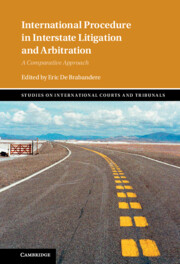Book contents
- International Procedure in Interstate Litigation and Arbitration
- Studies on International Courts and Tribunals
- International Procedure in Interstate Litigation and Arbitration
- Copyright page
- Contents
- Contributors
- Introduction
- Part I Pre-hearing and Selection and Appointment of Judges and Arbitrators
- 1 Registries and Secretariats of Interstate Dispute Settlement Authorities
- 2 Judicial Independence at International Courts and Tribunals
- 3 Designing for the Best Composition of International Courts
- 4 The Role of the Judge ad hoc in Interstate Litigation
- Part II Post-commencement Litigation Procedure and Strategy
- Part III Evidence and Witness
- Part IV Post-hearing and Effect of Decisions
- Index
3 - Designing for the Best Composition of International Courts
The Value of Diverse and Specialised International Law Expertise on the Bench
from Part I - Pre-hearing and Selection and Appointment of Judges and Arbitrators
Published online by Cambridge University Press: 18 November 2021
- International Procedure in Interstate Litigation and Arbitration
- Studies on International Courts and Tribunals
- International Procedure in Interstate Litigation and Arbitration
- Copyright page
- Contents
- Contributors
- Introduction
- Part I Pre-hearing and Selection and Appointment of Judges and Arbitrators
- 1 Registries and Secretariats of Interstate Dispute Settlement Authorities
- 2 Judicial Independence at International Courts and Tribunals
- 3 Designing for the Best Composition of International Courts
- 4 The Role of the Judge ad hoc in Interstate Litigation
- Part II Post-commencement Litigation Procedure and Strategy
- Part III Evidence and Witness
- Part IV Post-hearing and Effect of Decisions
- Index
Summary
This chapter discusses the appropriate types of expertise that should be available in the composition of international courts. The main argument is that the international bench needs to include judges with diverse and specialised expertise. For this reason, the concept ‘competence in international law’ as a statutory requirement for nomination and election of judges can be construed broadly, seeking out individuals who not only have recognised competence in international law sensu stricto but also strong complementary knowledge in specialised area(s) of international law relevant to a given court’s judicial work. Judges who are conversant with both general and special aspects and areas of international law are well placed to navigate the complexity and density of international law entrenched in disputes submitted for international adjudication. The first part of the discussion engages with the idea that general international courts value expertise of judges in specialised areas of international law and that specialised international courts value judges with competence in international law. Existing statutory election requirements can accommodate this suggestion. The second part of the discussion explores the detailed expertise requirements incorporated in the statutes of certain, new international courts. Novel developments suggest a turn towards favouring and quantifying required expertise in different areas of international law when deciding the overall composition of a court.
- Type
- Chapter
- Information
- International Procedure in Interstate Litigation and ArbitrationA Comparative Approach, pp. 89 - 112Publisher: Cambridge University PressPrint publication year: 2021

